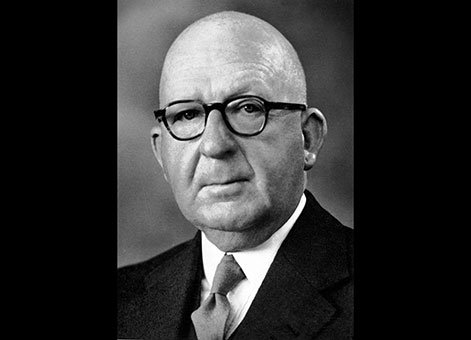Francis Malcolm Corkill was born in Australia in 1892 and came to New Zealand at an early age. He was educated at Kaikorai, and Paeroa. He also attended Auckland Grammar School for a year and Wellington College for three years, where he was head prefect in his final year, 1909. Corkill distinguished himself at Canterbury University, where he was awarded junior and senior university scholarships and an engineering travelling scholarship.

Francis Corkill, circa 1944, Past Presidents Album. IPENZ.
Engineering career
When World War One started he joined the Corps of Engineers, New Zealand Expeditionary Force. On demobilisation in 1919, Corkill took an appointment as Assistant Engineer with the Public Works Department of the Federated Malay States. During this time he continued to show a keen interest in military affairs and was adjutant and officer commanding the Malayan Volunteer Infantry in Negri Sembilas and officer commanding the civil guard in Selangor. Altogether Corkill had more than 40 years active and territorial service and was the holder of the New Zealand Service Medal and the Long and Efficient Service Medal.
In 1923 he became the Opunake Harbour Board’s Engineer and in 1925 accepted the appointment as Egmont County’s Engineer. Three years later he was appointed City Engineer in Invercargill, a post he held until his retirement in 1952. Corkill then became a local consulting engineer
Serving the profession and other interests
Corkill became a member of the New Zealand Society of Civil Engineers (now the Institution of Professional Engineers (IPENZ)) in 1923. He served as a member of Council from 1931 to 1941 and was elected Vice-President in 1943 and President in 1944. He was Chairman of the Southland Branch in 1934 and again in 1940. He was also a member of the Benevolent Association’s management committee from 1934–1964.
He was a member of the Institution of Municipal Engineers and of the Institution of Water Engineers. In 1932 Corkill served for two years on the Rural Roads Committee and was a member of the Commission of Inquiry into the Manukau sewage treatment.
Corkill was also a Member of Britain’s Institution of Civil Engineers from 1918 and served as the New Zealand representative on their Council from 1945–1948.
Corkill always maintained a keen interest in the promotion and welfare of the engineering profession. He set himself, and demanded of others, high standards of professional integrity. His advice and opinions were sought and respected by many, both inside and outside his immediate circle and he was indeed a pillar of the profession.
The diversity of his interests is exemplified by long terms as President of the University Association of Southland, of the Royal Society of New Zealand (Southland Branch), and of the Southland Aero Club, of which he was patron. He was also a member of the New Zealand Alpine Club.
He died on 15 September 1970.
Find out more
Source
New Zealand Engineering, November 1970, p.315
